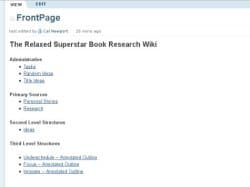Blocking Time
Earlier this year, I made an important improvement to my infamous 9 to 5 student work day. Instead of treating these hours as one undifferentiated mass, I added the following simple structure:
- Writing
- MIT #1
- Midday
- MIT #2
- Shoulder
The accompanying rules were simple. The first thing I do when I arrive at my office is write. I wrote my first two books predominantly between the hours of 9 and 10:30 am, and I’ve finished 2/3 of my new book during this same interval.






